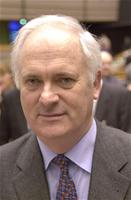John Bruton: Europe is facing difficult challenges
euinside, January 25, 2010
 As Europe emerges from the crisis, it confronts three major long term challenges: rising debt levels made worse by an aging population, tension between national and community institutions, and excessive dependence on imported energy. In a very timely and deep analysis the former EU ambassador to Washington John Bruton* writes in an article for the Carnegie Endowment for International Peace that without further political and economic integration, the Union will remain too constraint to meet these 3 challenges.
As Europe emerges from the crisis, it confronts three major long term challenges: rising debt levels made worse by an aging population, tension between national and community institutions, and excessive dependence on imported energy. In a very timely and deep analysis the former EU ambassador to Washington John Bruton* writes in an article for the Carnegie Endowment for International Peace that without further political and economic integration, the Union will remain too constraint to meet these 3 challenges.
As a major problem Mr. Bruton points out the ageing population in the EU. The problem is additionally aggravated by the financial crisis with average fiscal deficits deteriorating from 0.8 percent in 2007 to 6.9 percent in 2009 and debt levels projected to rise by 34 percent in the four years from 2007 to 2011, from 66.2 percent of GDP to 88 percent. John Bruton is quoting data of the European Commission.
Even more serious problem though is that currently EU member states, particularly those in the Euro area, are caught between two competing institutional structures. With a common monetary policy, but without the means to follow a common fiscal one, they are unable to independently control their economies. This hybrid structure does not have the legal capacity to tackle the great tensions that emerge from the Euro area’s diverse economic structures, governance and administrative capacities. (a very good illustration of John Bruton's position is the situation in Greece, n. e.)
Financial integration, practically is incomplete across the Euro area. Banks can and did borrow from one another and take deposits across borders. However, the system of cross-border financial supervision is underdeveloped, no common fund to protect depositors exists, and bank rescues remain the responsibility of individual states. If the system does not change, only banks housed in big EU countries, with big tax bases available for bank rescue, will be able to grow across the Union.
The author pays attention to another problem that exists and is being discussed for a long time in the EU - common energy policy, or - more precisely - the lack of such. EU countries already import 57 percent of their natural gas, primarily from Russia, and that number is expected to rise to 84 percent by 2030. The situation with oil is similar. And there the main obstacle is that EU members, and not the EU itself, remain largely in control of the instruments needed to deal with these challenges. The EU member states retain the sole power to raise taxes and control the vast bulk of public spending. Only one percent of GDP goes to public spending at the EU level, which is nothing compared to 40–50 percent at the national level.
The gloomy picture is further worsened by John Bruton's position about the role of the Lisbon Treaty. The long-gestated Lisbon Treaty does little to promote greater economic integration for now, but it does increase the potential for closer political collaboration and, hence the promise of increased economic integration - in the long run.
As a result of the Treaty, some decisions will now be made by majority, making them easier to  reach, though many important decisions, including all tax matters, still require consensus. The European Council now has a full-time President, who will chair the Heads of Government meetings, and whose powers will come mainly from his or her powers of persuasion. The fact that former Belgian Prime Minister Herman Van Rompuy, a respected economist with a deep interest in the major economic issues of the day, is the first to hold this post should help place the most important questions higher on the agenda.
reach, though many important decisions, including all tax matters, still require consensus. The European Council now has a full-time President, who will chair the Heads of Government meetings, and whose powers will come mainly from his or her powers of persuasion. The fact that former Belgian Prime Minister Herman Van Rompuy, a respected economist with a deep interest in the major economic issues of the day, is the first to hold this post should help place the most important questions higher on the agenda.
*John Bruton served as ambassador of the EU to the United States until 2009, and has also held the posts of taoiseach, minister for finance, and minister for industry, trade, commerce and tourism in Ireland.
 Federica Mogherini | © Council of the EU
Federica Mogherini | © Council of the EU | © Council of the EU
| © Council of the EU Luis De Guindos | © Council of the EU
Luis De Guindos | © Council of the EU